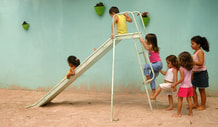 In the perfect world, kids treat each other with kindness, take turns, stand up to bullies and celebrate uniqueness. They also welcome outsiders to join their cliques until they are all one big happy family. Reality paints a different picture: kids fight, argue, make and break friendships, jealousies abound, tears are shed, personalities clash and parents draw battle lines to protect their children. As children begin their process of socializing, parents find that they are thrown into a brand new phase of adult socializing as well - a rite-of-passage they must endure! ‘…our close identification with our children means we can feel every trivial snub and jibe our kids experience all too keenly…’ Dr. Stephen Briers, ‘Playground politics for adults’ Here are some ‘Playground Issues’ you may be facing as a parent:
So. What can you do as a parent to survive playground politics?
Although there are no perfect answers, here are some guidelines that can help: 1. Think about what your child really needs:
Remember that your child will undergo some growing pain as he learns the ropes. This can be very hard to watch, but allowing him to experiencing these trials under your caring protection will equip him with lifelong skills. If you unable to handle a situation or it is getting out of hand, reach out to community resources/ friends/ a counselor for help. Parenting, especially in the present context, is a high-pressure job, and because it is so unique, there is really no handbook or manual that one can refer to for insyructions. If you take a look at much of the information on parenting, the focus most often is on the child. However, research indicates that there are many reasons for us to look inward and understand ourselves as people if our goal is to become a better parent.
We often project our critical feelings about ourselves on to our children. The ambivalent attitudes we have toward our children are simply a reflection of the ambivalent attitudes we have toward ourselves . All people are conflicted in the sense that they have feelings of warm self-regard as well as feelings of self-depreciation. Therefore, it is not surprising that parents would extend these same contradictory attitudes toward their child. Parents' attitudes toward their children are a by-product of their fundamental conflicts and ambivalence toward themselves. It is not uncommon for parents to disown their self-critical attitudes and negative self-image by projecting them onto their child. As a result, children begin to see themselves through a negative filter, which may stay with them throughout their lives. But if we look into ourselves and understand where our self-critical attitudes and self-attacks come from, we are likely to have more compassion for ourselves and our children. How often have you caught yourself saying the same things that you mom or dad said to you? Most parents have the experience, most often when reprimanding a child, of suddenly hearing themself say the same critical statement that their parent said to them. The reality is that, parenting style is often reenacted. If you feel that this is something you would like to change, then you will need to be open to revisiting that time in your life. Acknowledge how it felt when you were the child at the receiving end. With awareness, you will then be able to offer the warmth, affection, love, and the sensitive guidance necessary for your child's well-being. As a parent, you are a role model – the first and probably the one with the most impact. Psychologists have found that children really do as parents do, not as they say. The processes of identification and imitation overshadow any statements, rules, and prescriptions for good behavior. Children develop behaviors through observing their parents in day-to-day life. The fact that our children are looking to us to see how to be is enough of a reason for us to focus on our own development as a person. The bottom line here is that perfect kids and perfect parents do not exist. Parenting is a learn-as-you-go thing. We all make mistakes or do some things that we regret, or that are ineffective for our kids. That’s okay. The great thing is that tomorrow is a new day, and we can forgive ourselves, learn from our mistakes and move on. |
InnerSight BloggersAjanta, Mahesh and other InnerSight counsellors and guest contributors are happy to share their thoughts here. Categories
All
Archives
September 2020
|

 RSS Feed
RSS Feed